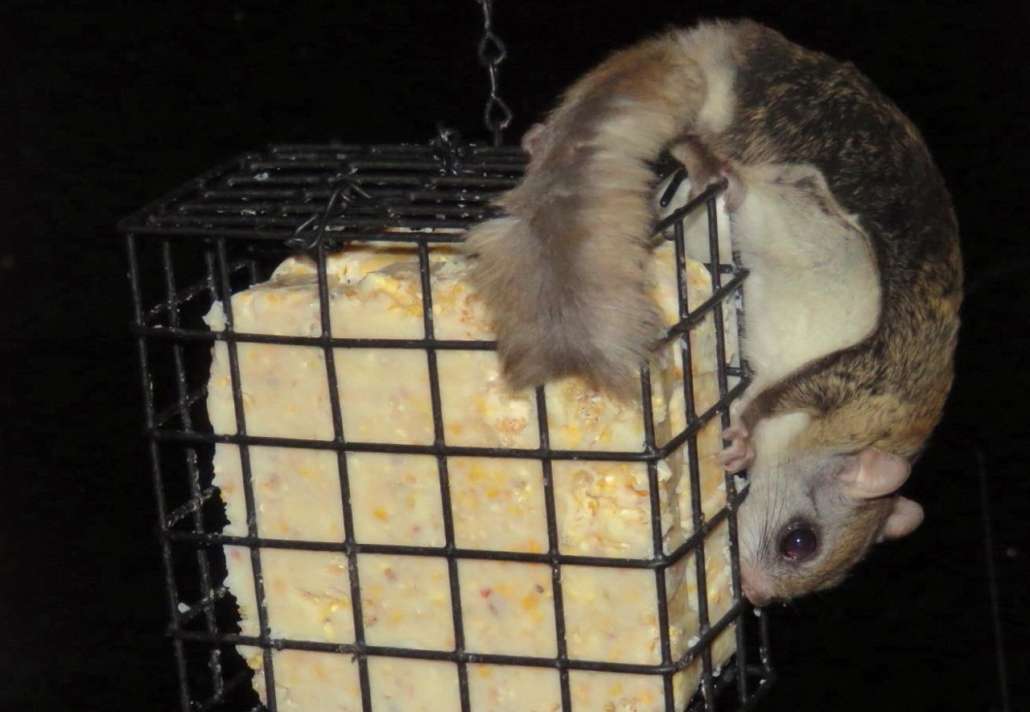CRITTER CHATTER: It’s typical to have 35 – 50 flying rodents at wildlife care center – Part 1
 by Jayne Winters
by Jayne Winters
When I stopped by the other day to deliver some muffins to Don Cote at the Wildlife Care Center, I was interested in a recent admission: a flying squirrel that had probably been hit by a car. I was hoping to get a close-up peek at it, but flyers are nocturnal animals, so it remained hidden under the bedding while I was there. Don said the squirrel was eating and drinking well, however, and was quite active during evening hours.
Although Duck Pond typically gets 35-50 flying squirrel admissions annually, Don stated he only had two the previous year, which he released in the spring. He suspects others may have been taken to other rehabbers or injuries aren’t being reported/treated. I wonder if climate change and/or loss of habitat is impacting their populations?
I found an article Carleen Cote had written and share some of her information: “Flying squirrels are nocturnal and seldom seen. Their eyes protrude, much like the eyes of a bat, an asset as they move about at night, gliding through the trees, from the highest limb to lowest. Although they are called flying squirrels, they actually glide by means of four covered folds of skin that extend from wrists to ankles, which provide a broad surface when the limbs are extended sideways. They have a flattened tail, are relatively lightweight and have extremely soft fur, much softer than velvet, which provides little friction resistance to air. Flyers are basically vegetarians but are not seed eaters, and they will consume insects and meat if it is available. They live in old woodpecker holes; several may occupy the same hole. Active all winter, they apparently do not store food.”
Carleen wrote a second column in 2012: “Flying squirrels are not chewers or destructive as are reds and grays. They gather together in the winter for warmth…So far this year we have 51 flyers in residence. Flying squirrels usually move into a building when cold weather arrives. If they become a problem and are trapped, they should never be released outside because they would probably freeze to death. Call the nearest rehabilitator to ask if they will hold them for the winter. We are always available to take any in need of a warm place to stay during the cold months.”
Next month, I’ll provide information from my research regarding habitat, diet, family structure, and characteristics of the flying squirrel. Did you know there are two species in Maine?
Although admissions typically slow down at this time of year, Don will get calls from folks worried about young animals now on their own, adjusting to life in the wild without their mothers’ care. Some are simply learning how to be independent, but others may indeed be orphaned or injured, struggling to survive. While Don continues to take them in, he does transfer rescues to other rehabbers who are generously providing assistance to help keep critter care at Duck Pond manageable. Please check the following web sites to see if there is a rehabber near you: https://www.mainevetmed.org/wildlife-rehabilitation or https://www.maine.gov/ifw/fish-wildlife/wildlife/living-with-wildlife/orphaned-injured-wildlife/index.html.
Donald Cote operates Duck Pond Wildlife Care Center on Rte. 3 in Vassalboro. It is a non-profit state permitted rehab facility supported by his own resources & outside donations. Mailing address: 1787 North Belfast Ave., Vassalboro ME 04989 TEL: (207) 445-4326. PLEASE NOTE THE PRIOR wildlifecarecenter EMAIL ADDRESS IS NOT BEING MONITORED AT THIS TIME.
Responsible journalism is hard work!
It is also expensive!
If you enjoy reading The Town Line and the good news we bring you each week, would you consider a donation to help us continue the work we’re doing?
The Town Line is a 501(c)(3) nonprofit private foundation, and all donations are tax deductible under the Internal Revenue Service code.
To help, please visit our online donation page or mail a check payable to The Town Line, PO Box 89, South China, ME 04358. Your contribution is appreciated!



Leave a Reply
Want to join the discussion?Feel free to contribute!